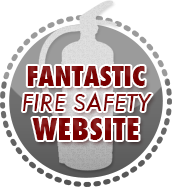Fire Extinguisher : 101
Fire Inspection Checklist for the Home
| Home |
| About Fire Extinguishers |
| Using a Fire Extinguisher |
| Fire Prevention |
| Fire Hazards |
| First Aid for Fire |
| Financial Protection |
| Biggest Fires in History |
| Firefighters |
This site was voted:

by onlinefiresciencedegree.org
(scroll to 74 on the list)
This page is intended to provide individuals with a fire inspection checklist for the home. |
Safeguarding a home against fire is largely the owner’s responsibility. It starts with recognizing where the problem areas are (both inside and out) and knowing what to do to minimize the potential risks.
Below is a categorized, easy-to-follow checklist that outlines important inspection points and offers fire prevention tips. It can save lives and prevent property damage. Print it and check off the circles as you complete the tasks.
Outdoor Maintenance:
Keep tree branches away from electrical wires and chimney openings with regular clipping. |
|
Clear the roof, rain gutters and eaves troughs of branches, leaves, pine needles and other debris with routine inspections. |
|
Ensure the home address number is clearly visible from the street so that first responders to a fire alarm can easily locate the residence. |
Indoor Heating:
Use space and water heaters at a minimum 3-foot distance from all flammable materials. |
|
Change furnace filters annually. |
|
Remove lint accumulation in the clothes dryer regularly. |
|
Install a spark arrester on both the fireplace and chimney stack. |
|
Schedule a chimney inspection and cleaning once a year. |
|
Discard fireplace ash carefully into designated metal receptacles. |
Electrical Components:
Do not overload electrical circuits. |
|
Occasionally check power cords, electronic equipment and appliances for signs of damage. |
|
Avoid fastening electrical cables to walls or running them beneath carpeting, where they are vulnerable to moisture and damage. |
|
Ensure proper air circulation around heat-sensitive devices such as televisions, refrigerators, stereo systems and computers. |
|
Rather than use extension cords, have extra outlets installed by a certified electrician. |
|
If extension cords are necessary, use only those integrated with a circuit breaker. |
Dangerous Chemicals and Materials:
Store minimal chemicals in the home. |
|
Dispose of flammable household chemicals and hazardous waste properly. |
|
Keep dangerous materials in tightly-sealed, labelled receptacles and away from sources of heat. |
|
Be sure the area is adequately ventilated when working with combustible chemicals or materials. |
|
Place used oily rags in metal receptacles with sealed lids. |
Cooking Devices:
| Do not leave foods being cooked unsupervised. | |
| Do not store flammable items near cooking appliances. | |
| Barbecue at a safe distance from the house. | |
| Empty the barbecue coals and ash into a metal receptacle for subsequent disposal. |
Cigarette Smoking and Candle Burning:
Do not leave lit cigarettes, cigars, pipes, or candles unsupervised. |
|
Use sturdy, deep ashtrays with cigarette supports |
|
Discard butts and ashes into a non-flammable container. |
|
Avoid smoking in bed. |
|
Set candles on strong, secure holders of a non-flammable material. |
|
Keep all lighters and matches out of children’s reach. |
Smoke Detection Units:
Install at least one smoke detector on every level in the house. |
|
Push the alarm’s “test” button monthly to confirm the unit’s proper function. |
|
Change the battery annually (every 6 months is recommended for optimal performance). |
|
Replace smoke detectors with new units every 10 years. |
Fire Extinguishers:
Have at least one multi-purpose (A-B-C) fire extinguisher in the home |
|
Instruct the family on how to operate a fire extinguisher using the basic “P.A.S.S.” technique (pull, aim, squeeze, sweep). |
|
Inspect fire extinguishers on a yearly basis. |
Emergency Home Evacuation:
Create and implement an effective home evacuation plan for the family. |
|
Carry out routine fire emergency drills with the family to put the plan into practice. Show each family member how. |

